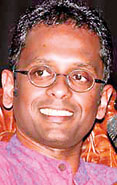It was a balmy evening when the members of the English Writers’ Cooperative gathered to listen to Shyam Selvadurai speak on writing and its many facets – and yes, pitfalls.
We didn’t discuss his award winning novels or even the Galle Literary Festival which he has curated these past two years. It was more a casual discussion of why and how we write and ways in which we as writers could improve our efforts.
 |
| Shyam Selvadurai |
Shyam began disarmingly saying that he didn’t think it helpful to tell other writers how to write, how to fix their manuscripts. The idea, he said, was to help each one find greater clarity about, “what you are trying to achieve in your short story – or in any other form of writing.”
Focus on a short story – even your own – and see what is most clear to you as a reader. What is most vivid, most engrossing? “Where your heart leaps and your eye can’t be pulled from the page.”
Look out for what confuses you as the reader, what is unclear about what is happening in the narrative. Be as specific as you can be as to why something is not clear to you.
Is it something in the way a character is presented, or a point in the plot that you don’t understand? Or a sentence whose meaning remains unclear.
Through his friendly and informal manner the experienced writer in him emerged.
He cited examples from his teaching in academia, and his own writing. To him, the opening in a piece of writing should be considered carefully. In order to orient oneself to the fictional world the opening should give the reader what he needs to find out what the rest is all about.
Think in terms of location, time and character relationships, he said, in answer to a question by a would-be writer.
How would you describe the chosen voice? Does it seem a good choice? How would you describe the effect of the voice on you as a reader?
Look carefully at your plot and ask yourself ‘are these scenes and moments necessary? Are there scenes and plot points that are missing? What about a rising action in the plot and does your story need a rising action? Ask yourself if the plot builds to a satisfactory climax – or is there a climax at all?
Is there any kind of an epiphany for the character(s) and does your story need an epiphany at all?
Of characters and their role he had some definite points for would be writers. Make their intentions clear, he said and make them speak in distinct voices. Give the character(s) clearly developed backgrounds and back locations.
Do they pulse with their own inner life? Do their actions match their intentions or are they muddled?
There are choices a writer makes in terms of rendering characters, situations and themes. You, as the writer, must ask yourself are they interesting or are they clichéd? Do they read like things from TV land?
Does your story lift off the page? |


